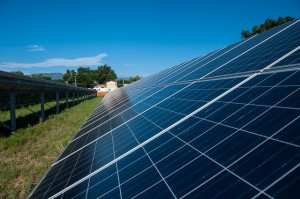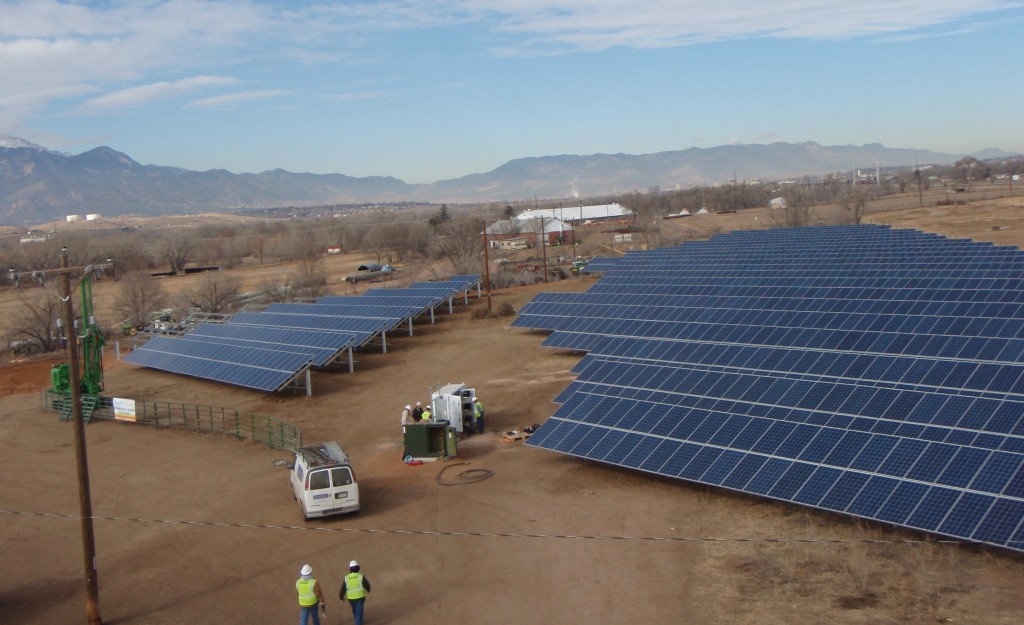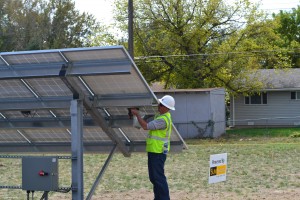A Denver-based solar company is heating up its effort to harness the sun’s rays.
SunShare, a company that builds small solar farms (often referred to as solar gardens) recently placed a bid with Xcel Energy to build 16 solar projects around Denver. The proposed sites would produce 28 megawatts of energy, almost four times as much as the company’s current Denver-area projects can generate. As many as 14,000 homes could benefit.
“A lot of projects are ready for permitting, and we have customers lined up,” said J.W. Postal, SunShare’s senior vice president. “We hope to be starting construction in winter and build them in a five-month time frame.”
Community solar gardens are solar panel facilities that allow homeowners, businesses and municipalities to tap the power of the sun without installing panels on their houses or buildings. Instead, the users purchase a certain number of kilowatts in the garden and collect credits from their power company.
A SunShare subscription isn’t significantly less expensive than a monthly electric bill. But it can help users shrink their carbon footprints by decreasing reliance on fossil fuels.
“We charge a rate for kilowatt hours,” Postal said. “The customer pays as they go and puts nothing down.”
SunShare is bidding to build more solar gardens through Xcel’s Solar Rewards Community program, established in collaboration with the Colorado Public Utilities Commission after a 2010 bill called for the creation of community solar gardens in the state.
In 2013, Xcel chose SunShare to build solar facilities in Denver, Adams, Arapahoe and Jefferson counties with a capacity to generate 7.5 megawatts of energy, enough to power as many as 3,750 homes. Those projects will be producing energy by the fall, Postal said.
The latest round of bids was due to Xcel July 9. The company will announce which projects it wants to pursue by August 20, according to a request for proposals.
“We’re hoping to win a lot,” Postal said. “We won 100 percent of the bids in 2013, and there’s the chance that could happen this time.”
If Xcel accepts SunShare’s proposal, the Denver-based utility will have nearly maxed out the amount of solar energy the Public Utilities Commission will let it produce annually. In December, the commission voted to raise the cap on Xcel’s program from 6 megawatts to 30 megawatts each year, allowing companies like SunShare to place larger bids.

SunShare has seven solar gardens in operation or in the works, including one at Good Shepard United Methodist Church in Colorado Springs.
One megawatt of solar power can provide energy for 275 to 500 homes during a 20-year period, Postal said.
“Most residential customers have a deal with Xcel where they’re able to save a little bit each month or hedge against future unknown energy rates,” Postal said.
But residential customers make up only about 10 percent of SunShare’s customer base, Postal said. The company sells about 90 percent of its energy to businesses and municipalities because those customers often use electricity that costs more than residential power. Some of its customers include the city of Denver, several school districts in Adams County and Water World.
“Commercial and government customers can save a significant amount of money because we’re offsetting specific meters,” Postal said. “Residents don’t have demand meters at their homes.”
SunShare was founded in Colorado Springs in 2011. It has since moved its headquarters to Denver, but it’s still building projects in the Springs. Two solar gardens that could power more than 1,000 homes are now under construction there. Two have already been built.
The company now employs 52 people, and Postal said it is looking to hire more engineers and builders by the end of the year.
The proposed projects would cost nearly $30 million to build. Postal said the company would fund it in part using $20 million in capital it’s now working to raise. It had raised $3 million at the start of the month, according to SEC filings.
Postal said the money would also allow the company to expand into other markets such as California or the mid-Atlantic.
“Last year we made a big move into Minnesota,” Postal said. “The additional markets we’re looking at we’re making decision on in the next couple of weeks.”
A Denver-based solar company is heating up its effort to harness the sun’s rays.
SunShare, a company that builds small solar farms (often referred to as solar gardens) recently placed a bid with Xcel Energy to build 16 solar projects around Denver. The proposed sites would produce 28 megawatts of energy, almost four times as much as the company’s current Denver-area projects can generate. As many as 14,000 homes could benefit.
“A lot of projects are ready for permitting, and we have customers lined up,” said J.W. Postal, SunShare’s senior vice president. “We hope to be starting construction in winter and build them in a five-month time frame.”
Community solar gardens are solar panel facilities that allow homeowners, businesses and municipalities to tap the power of the sun without installing panels on their houses or buildings. Instead, the users purchase a certain number of kilowatts in the garden and collect credits from their power company.
A SunShare subscription isn’t significantly less expensive than a monthly electric bill. But it can help users shrink their carbon footprints by decreasing reliance on fossil fuels.
“We charge a rate for kilowatt hours,” Postal said. “The customer pays as they go and puts nothing down.”
SunShare is bidding to build more solar gardens through Xcel’s Solar Rewards Community program, established in collaboration with the Colorado Public Utilities Commission after a 2010 bill called for the creation of community solar gardens in the state.
In 2013, Xcel chose SunShare to build solar facilities in Denver, Adams, Arapahoe and Jefferson counties with a capacity to generate 7.5 megawatts of energy, enough to power as many as 3,750 homes. Those projects will be producing energy by the fall, Postal said.
The latest round of bids was due to Xcel July 9. The company will announce which projects it wants to pursue by August 20, according to a request for proposals.
“We’re hoping to win a lot,” Postal said. “We won 100 percent of the bids in 2013, and there’s the chance that could happen this time.”
If Xcel accepts SunShare’s proposal, the Denver-based utility will have nearly maxed out the amount of solar energy the Public Utilities Commission will let it produce annually. In December, the commission voted to raise the cap on Xcel’s program from 6 megawatts to 30 megawatts each year, allowing companies like SunShare to place larger bids.

SunShare has seven solar gardens in operation or in the works, including one at Good Shepard United Methodist Church in Colorado Springs.
One megawatt of solar power can provide energy for 275 to 500 homes during a 20-year period, Postal said.
“Most residential customers have a deal with Xcel where they’re able to save a little bit each month or hedge against future unknown energy rates,” Postal said.
But residential customers make up only about 10 percent of SunShare’s customer base, Postal said. The company sells about 90 percent of its energy to businesses and municipalities because those customers often use electricity that costs more than residential power. Some of its customers include the city of Denver, several school districts in Adams County and Water World.
“Commercial and government customers can save a significant amount of money because we’re offsetting specific meters,” Postal said. “Residents don’t have demand meters at their homes.”
SunShare was founded in Colorado Springs in 2011. It has since moved its headquarters to Denver, but it’s still building projects in the Springs. Two solar gardens that could power more than 1,000 homes are now under construction there. Two have already been built.
The company now employs 52 people, and Postal said it is looking to hire more engineers and builders by the end of the year.
The proposed projects would cost nearly $30 million to build. Postal said the company would fund it in part using $20 million in capital it’s now working to raise. It had raised $3 million at the start of the month, according to SEC filings.
Postal said the money would also allow the company to expand into other markets such as California or the mid-Atlantic.
“Last year we made a big move into Minnesota,” Postal said. “The additional markets we’re looking at we’re making decision on in the next couple of weeks.”



Leave a Reply